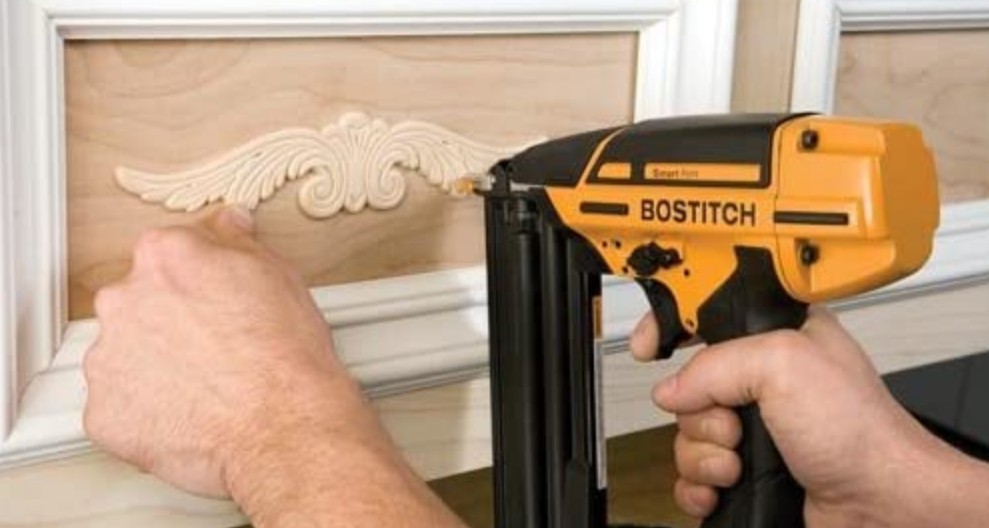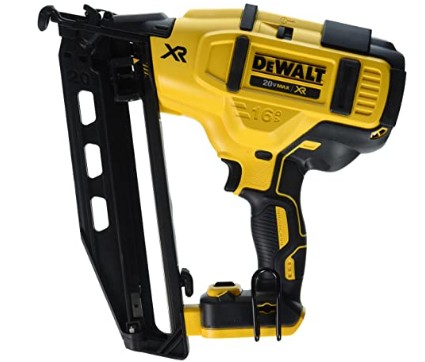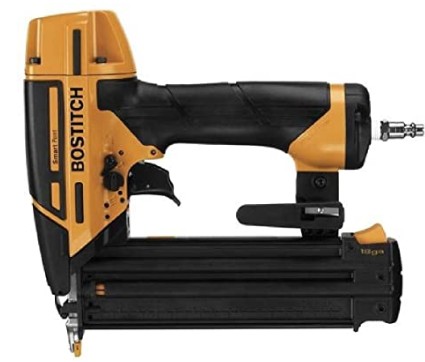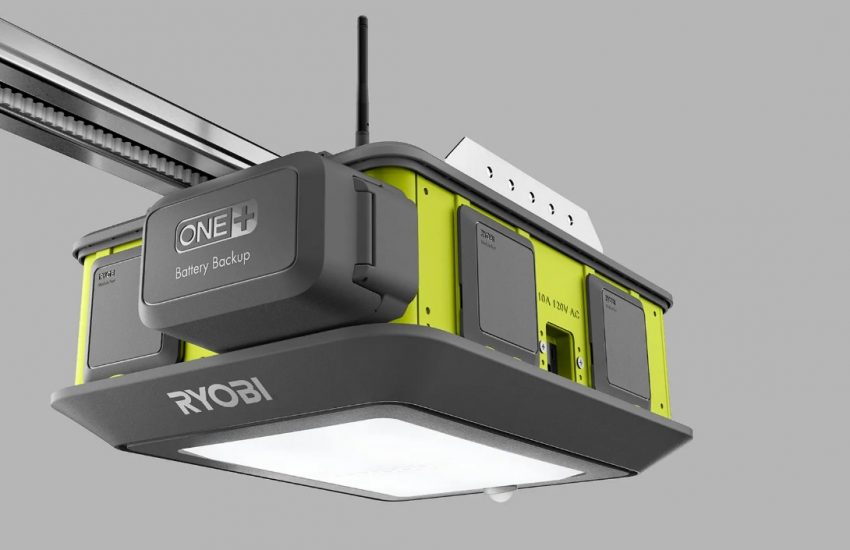16 Gauge Vs. 18 Gauge Brad Nailer: Which Should You Get?
Whether you’re a novice or expert, we all know that choosing the correct fastener gauge is essential for a clean woodwork project. However, woodworkers are often split over the appropriate gauge to use when using a brad nailer. Choosing the right fastener size will determine the stability of the woodwork and finished look. So what do you choose between a 16 gauge and 18 gauge nailer?
The answer to this question depends on personal preference and the type of project you have. The most significant difference between the 16-gauge and 18-gauge brad nailer is that the former uses thicker nails than the latter. The best way to decide what gauge to use is first to understand what each gauge is ideal for, what each gauge can and cannot do. This article will provide you with the necessary information on the differences, similarities, and uses of a 16 gauge and 18 gauge nailer.
What does gauge mean?
The gauge of any nail gun generally refers to the dimensions of the nails. When it comes to a brad nailer, a gauge is the thickness of the nail and the diameter of the nail head. The gauge size is also the number of the gauge is the number of nails or pins that fit in one inch when lines side by side. The general rule is the lower the gauge number, the thicker the nails. Therefore, nails that fit 16 into one inch of the nailer band are typically bigger than the 18 nails per inch.
Pros of a 16-gauge nailer
- It is most suitable for projects that require more stability and holding power.
- Excellent for penetrating large baseboards and plywood and attaching large crown molding.
- It uses nails of 1-3½-inch in length.
Cons of a 16-gauge nailer
- It is more likely to split thinner wood and narrow boards.
- The bigger nails do not give a neat or smooth finish, therefore, requiring filling and sanding.
Pros of an 18-gauge nailer
- It is most suitable for finer and more delicate wood projects.
- It requires little to no filling with wood putty or sanding.
- It uses nails of ½-2½-inch in length.
Cons of an 18-gauge nailer
- It has less penetrating strength compared to a 16-gauge nailer.
- It does not penetrate heavier and larger wood and moldings well like MDF.
- It does not reach corners and tight spots easily.
What is the difference between 16-gauge nailers and 18-gauge brad nailers?
The choice of what nailer gauge fits best depends on some factors, which we have explained below.
Size of projects or tasks
Due to its smaller size, the 18 gauge nailer is most suitable for small and light projects and attaching a thin board. Examples of some best-suited projects for an 18-gauge nailer are furniture construction, picture frame assembly, cabinet installation, and finishing touches. The 18-gauge brad nails are not strong enough to hold a workpiece and give it stability, but they provide a smoother and cleaner finish.
On the other hand, a 16-gauge nailer is great with heavier projects that use thicker wood boards that attach directly to the wall and give better support. A 16-gauge nailer would is more suitable for tasks like casing windows, bedding, dado rail, molding, trimming, and baseboards. Therefore it is best for projects that require more structural integrity and durability.
Nail size
The gauge number determines the size and thickness of the nail. The higher the gauge number, the smaller the pin is. It means that the nails used on an 18 gauge nailer are slightly thinner than those on a 16-gauge nailer. The diameter of the 16-gauge nail is 1/16 of an inch wide while the diameter of the 18-gauge nail is less than 2/64 of an inch. The nail diameter is essential as it affects crown molding and how it attaches to the trim.
For instance, you have to use bigger nail sizes for thicker boards to avoid bending the nail, while thinner boards require smaller-sized nails. Both 16-gauge and 18-gauge nails can go through light boards without leaving visible marks, but the 16-gauge nails are more likely to cause cracking since it is slightly thicker.
Type of wood
The type of wood you want to use for your projects may also affect the size of the nailer to use. Soft and smaller types of timber will require the 18-gauge nailer, while thicker types of food like fencing require the 16-gauge nailer. Using the 18-nailer gauge on thicker wood will bend from the pressure of the nails.
Versatility
Professional woodworkers consider the 16-gauge nailer more versatile as it works with any heavy woodwork due to its strong holding power. These nailers are also available in pneumatic and cordless configurations. On the other hand, 18-gauge nailers create weak attachments that are very easy to split by hand.
Finish
For clean and neat finishes, the 18-gauge nailer is what you should go for because of the thinner nails. However, the 16-gauge nailer is more likely to leave dents on the wood surface, and you may have to apply some wood putty for a smoother finish.
Attachment force
Both nailers are great for attaching boards, but the force exerted is different. The 16-gauge nailer has a greater attachment force making it great for heavier tasks. The 18-gauge nailer has a smaller attachment force.
Check this too: What Is a Pin Nailer Used For
What are brad nailers good for?
Brad nailers are specialized nail guns for detailed woodwork and have typically replaced hammers. Brad nailers are great for applying trimming and molding or applying finishing touches to a woodwork project since they use very thin pin-like nails. In addition, brad nailers are great when you need to do light woodwork around the house as they drive nails without splitting small wood boards. Here are some other uses of a brad nailer.
Baseboards
Due to the small-sized nails, a brad nailer is great for attaching baseboards to walls or larger wood pieces effortlessly. Baseboards are fragile. Therefore, they require thinner nails and a nailer that uses the right amount of force without splitting or cracking the wood. Brad nailers also give the neatest finishing and do not leave marks or dents that require finishing putty.
Crown molding
Crown molding is the small baseboard covering the lining between the ceiling and the wall surface, which requires thin nails for a smooth finish.
Crafts
A brad nailer is easy to use, which makes it suitable for DIYers and woodwork beginners. As a beginner, the brad nailer is user-friendly, and you can easily remove the nails without much damage to the wood as it doesn’t have much-holding power.
The best 16-gauge and 18-gauge nailers
If you’re working on heavier projects, you should go for the 16-gauge nailer but if you plan on trimming and molding, choose the 18-gauge nailer. Below we have given a review of our top-picks brands of a 16-gauge and 18-gauge nailer to help you make it easier to choose between the two options.
1. DEWALT 16GA Finish Nailer
Dewalt is a very popular brand with great power tools, including a variety of nail guns. This specific nailer uses 20-volt batteries, which eliminates the need for a compressor or gas tank. It also features multi-functional LED lights, which illuminate the workspace and tool diagnostics.
Features
- 16 gauge finish nailer
- 1 inch to 2 ½ inch nail length
- 20-degree angle
- 20-volt batteries
Pros
- It is durable with excellent construction quality.
- It is cordless, which allows for easy mobility.
- User-friendly for both right-handed and left-handed users.
Cons
- It is heavy.
Check this too: Best Battery Powered Nail Gun
2. BOSTITCH 18GA Nail Gun, Brad Nailer
The Bostitch 18-gauge (BTFP12233) nailer is an air-powered brad nailer that uses 18-gauge brad nails of 5/8-inch to 2-1/8-inch in length. It has a Tool-free jam release mechanism for easy nail removal and prevents jamming. In addition, this 18-gauge brad nailer is oil-free, reducing the risk of oil stains and making the tool maintenance very low.
Features
- 18-gauge brad nailer
- 5/8-inch to 2-1/8-inch nail length
- Air-powered
- 110 volts
- Selectable trigger system
Pros
- It is easy to use.
- It is lightweight and durable.
- It requires low maintenance.
Cons
- The straight magazine does not fit in tight spots.
- It does not indicate how many nails are in the magazine.
Wrapping it up
When deciding whether to go for a 16-gauge or 18-gauge nailer, you should consider the weight and thickness of your wood piece. The 16-gauge nailer is great for thicker and harder wood, while an 18-gauge nailer is most suited for thinner woods and has a neater finish. If your budget allows, especially if its a business, you should get both so that you have the proper brad nailer for a variety of moldings and trims




